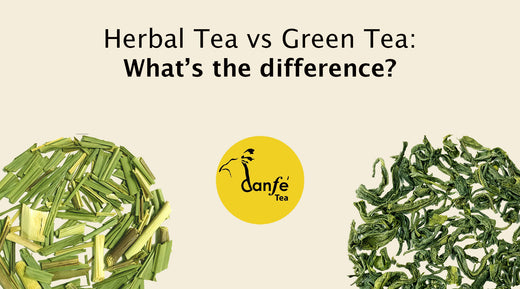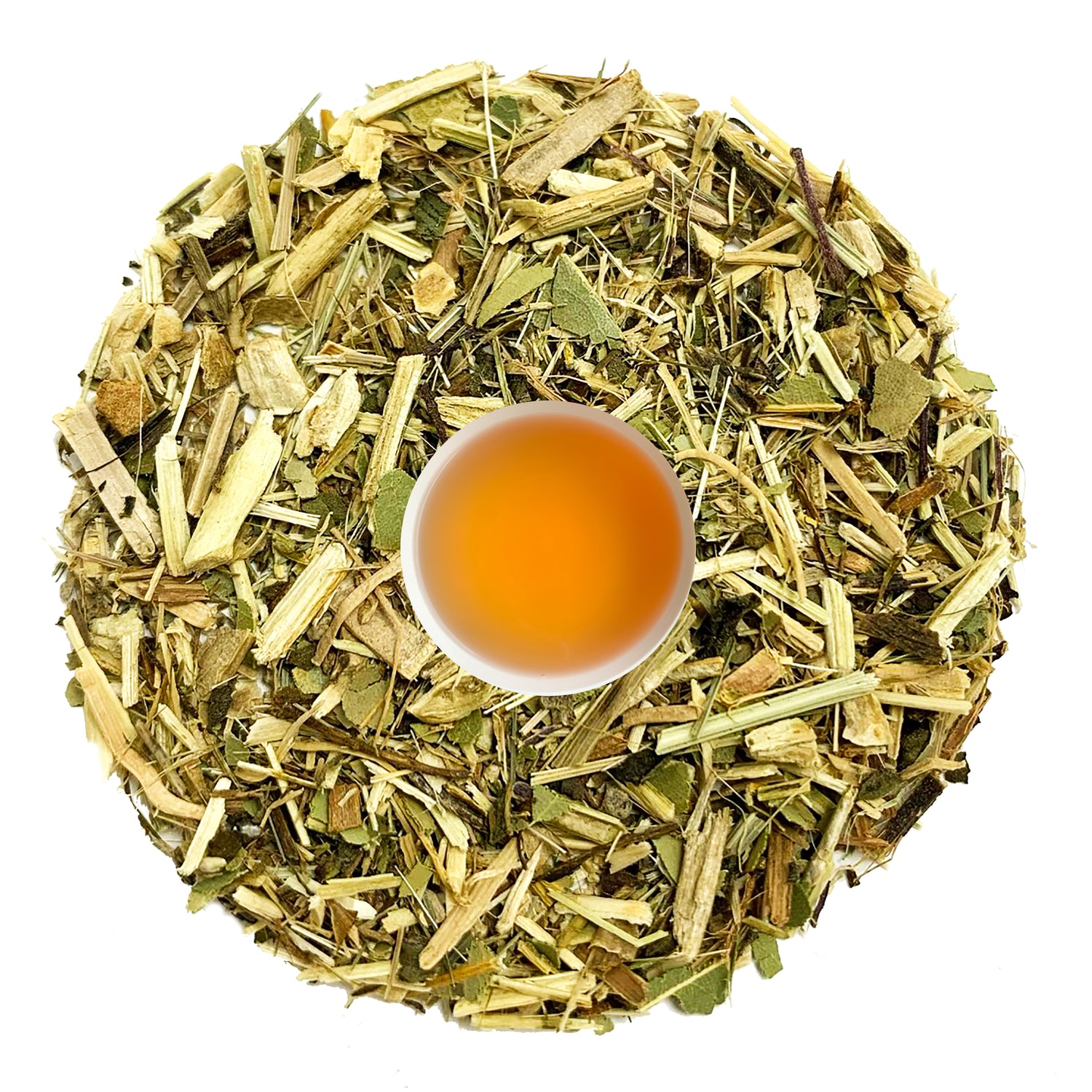
Herbal Tea vs Green Tea: What are the differences?
First discovered in China in 2737 BC, Tea has now taken over the entire world, and with the global expansion of tea, people started experimenting with the delicious beverage. While some people have become accustomed to using unique blends of tea, some are still not clear about their disparities. Green tea vs Herbal tea is the most common confusion among people interested in drinking tea these days.
Here we’ll be discussing the difference between green tea and herbal tea, and find out which one is the best among these two teas.
What is Green tea?
Green tea is made from a particular plant, Camelli Sinesis. Its leaves and buds are slightly steamed to create an aromatic taste in it. The length and intensity of the tea-making process are what determine which type of tea it is. What makes Green tea an exceptional tea is that it undergoes less processing than Oolong tea and black tea. Unlike oolong tea and Black tea, Green tea doesn't undergo the withering, rolling, and oxidation process. Green tea has a negligible amount of calories and it doesn’t contain fat, carbohydrates, or protein.
What is Herbal Tea?
Mother nature offers a wealth of flora and fauna other than the Camellia Sinensis plant. Herbal tea is an infusion of various herbs, flowers, fruits, roots, and spices, which are edible non-tea plants. Herbal teas have gained huge popularity over the past few years primarily because of the Health benefits along with vibrant flavors. There is a variety of Herbal teas each having a unique flavor, aroma, and health benefits. Herbal teas have healing properties and have been used for medicinal healing purposes before the advent of modern medicine.
Is Green Tea the Same as Herbal Tea?
The answer is no. Green tea comes from the Camellia sinensis plant, the same plant responsible for black and oolong teas. Its leaves are processed in a way that halts oxidation, helping the tea maintain its green color and preserving its rich antioxidant profile, specifically catechins. Herbal tea, in contrast, is not a true tea because it doesn’t originate from the Camellia sinensis plant. Instead, it is an infusion of various plants, including leaves, roots, flowers, spices, and herbs.
So, Is green tea herbal tea? - you have got the answer.
Green Tea vs Herbal Tea: Key Differences
Now, let's dive deep into the key differences.
Green Tea vs Herbal tea: Ingredients
Key ingredients are what make green tea and herbal tea completely different from each other. Green tea is made from a particular plant i.e. Camellia Sinensis tea plant while herbal tea can be made from the infusion of various herbs, spices, fruits, or flowers.
Camellia sinensis grows more as a shrub than a tree. Green tea may only contain Camellia sinensis leaves or it can also be blended with other plants to add flavor to it.
Herbal teas, on the other hand, can be made from nearly any plant you can imagine. Mint tea, rose tea, sage tea, lavender tea, chamomile tea, cherry tea, and apple tea are some examples of Herbal tea.,
Green tea vs herbal tea: How are they produced?
Green Tea
As we mentioned earlier, green tea is made from the same Camellia sinensis plant which is used to make oolong tea, black tea, and white tea. The variance in the withering and oxidation process is what makes them different from one another.
Green tea does not undergo oxidation while oxidation is fundamental to creating black tea and Oolong tea. Oxidation is a process where the enzymes inside the tea leaves come in contact with the oxygen in the air and start turning darker.
Oxidation is the process that causes the browning of an apple brown when it is cut and left open in the air. Tea leaves are hand-rolled or machine-rolled to hurt them enough so that the enzymes inside the leaves appear on the surface and react with the oxygen in the air. The longer the leaves are left for oxidation, the darker they get. Oolong tea is oxidized until its oxidation level reaches the range of 50-70% while the oxidation level of black tea tends to 100%. In contrast, tea leaves are prevented from oxidation to make green tea.
Herbal Tea
Unlike green tea, herbal tea doesn’t use the tea plant. People use dried fruits, flowers, spices, and herbs in varying ratios, pour hot water on them, and let them sleep until the herbal tea reaches the strength of flavor before starting to drink.
Green tea vs herbal tea: Which one is caffeine-free?
Green tea is a good source of caffeine while most herbal teas are caffeine-free. Add in the fact that usual herbal teas have less antioxidants than green tea. Green tea in general has about 50% caffeine in comparison to a strong Black Tea. Due to the good caffeine content, green tea is the preferred choice to have when the 2 PM slump hits you but you don't want to drink coffee. You normally wouldn't find green tea in someone's bedtime tea collection.
Herbal teas are naturally caffeine free which is why those who are sensitive to caffeine or want to limit their caffeine consumption prefer herbal tea over green tea. Herbal teas are excellent for those looking for certain benefits from the herb they're using or someone who has to follow a strict diet without caffeine.
Green tea vs herbal tea: Different health benefits
As Green tea and Herbal tea are derived from different plants, they have different health benefits. Green tea is loaded with antioxidants, Catechins, Theanine, and various vitamins which makes it a healthy drink. Green tea is synonymous with health benefits such as:
- Helps the metabolism and burn fat; green tea is probably the best tea for weight loss.
- Hinders the development of cancerous growth.
- Balances cholesterol levels.
- Aid for Alzheimer's and Parkinson's disease.
- Capacity to fight with Type 2 Diabetes.
- Its caffeine helps you stay awake and stay focused.
The list goes on. Herbal tea, meanwhile, has a different story. As herbal teas are made from a variety of fruits and plants, they have a variety of health benefits. While many herbal teas are used as natural remedies some beverages are marketed as "herbal tea" but are nothing but sugary water. We advise you to keep cautious.
Herbal Tea vs Green Tea Side Effects
As herbal teas are caffeine-free, they are most relaxing. Most herbal teas are harmless, however, some herbal teas, for example, raspberry leaf tea might be discouraged for pregnant or nursing women. Herbal teas including Tulsi Herbal tea, rooibos tea, mint tea, chamomile tea, and general fruit teas are normally considered safe for the general population.
Consuming Green Tea in excessive amounts can cause headaches, nervousness, insomnia, vomiting, diarrhea, irregular heartbeat, and convulsions.
Anybody with a medical condition or pregnancy might want to check with their doctor before consuming any Herbal or Green tea to avoid unwanted side effects.
Green Tea vs Herbal Tea: Difference in Flavor Profile
Green tea has a very specific natural flavor while the flavor profile of herbal tea depends on which herbal tea you are trying out. Since green tea is not fruity or sweet, it may not be a choice for many. Some green teas are pretty astringent and have a definite vegetal flavor. Many add sweeteners to green tea, but doing so may hinder the antioxidants from doing their job of providing health benefits.
Green Tea vs Herbal Tea: Which One to Choose?
Green tea and herbal tea are completely different tea types but these two teas have a few things in common as well. And if you know both sides, it will help you choose the best one for you. The choice between green tea and herbal tea depends on why you want to have one. If you want to keep awake and stay focused without the jitters then green tea could be the best choice for you. However, if you just want a nice cup of tea for relaxation and or want to settle down after a long day's work then you must go for herbal tea.
But, the best part of this green tea vs herbal tea debate is that you can blend them. Blending green tea with a herbal tea adds both flavor and health benefits to the beverage.
Buy the Finest Loose-Leaf Teas from the Himalayas
Danfe Tea brings you the finest loose leaf tea from the Himalayas. With over 30 natural loose-leaf tea variants, we offer 1 lb variants and also offer monthly tea subscription.










